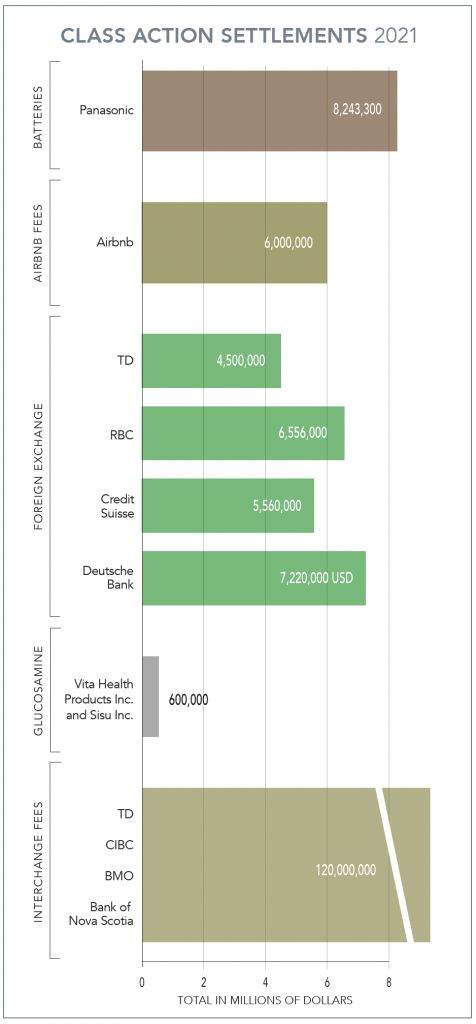TOP STORIES
Double Double Dismissal The Federal Court and the B.C. Supreme Court double-teamed "buy-side" statutory conspiracy claims in a pair of quintessentially Canadian class action decisions.
In British Columbia, the court struck pleadings alleging that Tim Hortons had breached the Competition Act's criminal conspiracy provisions by including "no-hire" clauses in its franchise agreements. The clauses barred franchisees from hiring employees from other Tim Hortons locations.
Similarly, the Federal Court refused to permit a pleading amendment alleging that the National Hockey League and various minor hockey leagues had conspired to limit the ability of hockey players to negotiate and play with teams in the NHL, and further conspired to impose unreasonable contractual terms on minor hockey players.
In both cases, the courts found that the criminal statutory conspiracy provision only applies to hard-core cartel agreements, which are unambiguously harmful to competition. The courts held that the criminal provision does not apply to "buy-side" agreements among competitors, which under certain circumstances could be pro-competitive. The lawfulness of "buy-side" agreements can be reviewed by the Competition Tribunal in an Application by the Competition Bureau under s. 90.1 of the Act but cannot be litigated by private parties in the civil courts.
The Chips are Down The Federal Court dismissed a certification motion in the DRAM class action.
The plaintiffs alleged that the world's leading manufacturers of DRAM computer chips had conspired to limit the global supply of DRAM in order to force an increase in prices. Intentions about future supply were alleged to have been communicated through private conversations and through public statements in furtherance of the alleged conspiracy.
The Federal Court held that the plaintiffs' allegations about the existence of a conspiracy were speculative and based on bald assertions. As a result, the claim failed to disclose a reasonable cause of action and did not provide any basis in fact to conclude that the case presented sufficient common issues to warrant certification.
PRIVATE ACTIONS AND CLASS ACTIONS
Declined Card The Alberta Court of Appeal decided that Wal-Mart and Home Depot lacked standing to appeal settlements that were approved by Court of Queen's Bench in the Interchange class action. This decision follows similar decisions in this case from appellate courts across the country.
Whole Lotta Funding Litigation funding agreements were approved by the Federal Court in the Generic Drugs price-fixing class action, and in a price-fixing class action against Amazon.
REVIEWABLE MATTERS
Big Clicks The Competition Bureau obtained a production order as part of its ongoing investigation into whether Google is abusing a dominant position in the market for online advertising.
MARKETING PRACTICES
Hot Ticket A class action in BC raised allegations of misrepresentation against Ticketmaster related to its secondary market ticket sales platform. Claims under the Act were dismissed as they failed to draw a causal connection between the alleged misrepresentations and damages allegedly suffered by the class. However, a cause of action under BC's consumer protection legislation was certified.
Money Bags The B.C. Supreme Court certified a class action where Westjet Airlines was alleged to have engaged in double ticketing of its checked bags, contrary to s. 54 of the Act. It is alleged that Westjet initially expressed a price of $0 for a first checked bag, while it simultaneously expressed a second price of $25.00 – $35.40 for a first checked bag.
Grounded FlightHub Group Inc. agreed to pay a penalty of $5 million, and two of its executives agreed to pay fines of $400,000 each, in connection with deceptive marketing practices which misled consumers about the costs and terms of flights booked through FlightHub.com and JustFly.com.
Tax Trouble Canada Tax Reviews was unsuccessful in its attempt to vary a production order issued by the Federal Court. The Bureau obtained the order as part of an investigation into allegedly misleading claims made by Canada Tax Reviews when promoting services to Canadians looking to apply for government COVID-19 benefit programs.
Tough Pill to Swallow A misrepresentation class action was certified against a group of Supplement Manufacturers wherein class members alleged those manufacturers falsely represented that their supplements contained glucosamine chondroitin.
Out in the Cold A class action was certified against the manufacturer of COLD-FX related to alleged misrepresentations that COLD-FX was proven to help with cold and flu symptoms.
Running on Empty Ontario's Divisional Court dismissed an appeal by class counsel in the Dirty Diesel class action of a decision denying certification. The Divisional Court agreed with the lower court that the class failed to put forward any evidence of compensable harm.
MERGERS
Cable Guy The Bureau is investigating the proposed acquisition of Shaw Communications Inc. by Rogers Communication Inc. in order to determine if the merger will likely result in a substantial lessening or prevention of competition in the Canadian telecommunications sector.
Tervita, the Sequel The Bureau commenced an Application before the Competition Tribunal seeking to block Secure Energy Services Inc.'s acquisition of rival oil and gas waste service provider Tervita Corporation. This is a sequel of sorts to the Bureau's earlier litigation challenging Tervita's acquisition of a smaller competitor which went all the way to the Supreme Court of Canada.
Preventing Precipitous Pulp Profits A merger between Karta Halten B.V. and Domtar Corp., two of Canada's largest pulp and paper manufacturers, was set to substantially lessen competition for the purchase of wood fiber, which is a key input in the manufacture of pulp. The Bureau secured an agreement that Karta Halten B.V. will sell its newly acquired pulp mill in Kamloops, B.C. to address these competitive concerns.
Oh Ship The Bureau is investigating PSA Canada Ventures Ltd.'s proposed acquisition of Ceres Halifax Inc. The two companies are the only two container terminal operators at the Port of Halifax.
Seedy Business Federated Co-operatives Limited and Blair's Family of Companies agreed to sell Blair's retail location in Lipton, Saskatchewan in order to address the Bureau's concerns about substantially lessened competition in the town's retail crop input market arising from the parties' joint venture.
Threshold Drops The 2021 pre-merger notification threshold relating to transaction size was reduced to $93 million from the 2020 threshold of $96 million.
A Garbage Deal The Bureau commenced an Application before the Competition Tribunal seeking to compel GFL Environmental Inc. to dispose of Western Canadian assets obtained in the acquisition of its industrial waste service and oil recycling competitor Terrapure Environmental Inc.
Divesting Gas The Bureau entered into an agreement that required MacEwen Petroleum Inc. to sell a retail gas station in Kemptville, Ontario as part of a broader acquisition of 51 Quickie convenience stores.
Commodity Exchange S&P Global Inc. was required to sell certain commodity price assessment businesses to News Corporation to resolve the Bureau's competition concerns arising from S&P Global's earlier acquisition of IHS Markit Ltd. Both S&P Global and IHS had operated competing price reporting agencies that supplied price assessments for commodities such as oil, coal, and liquified petroleum gasses.
CRIMINAL MATTERS
Stop the Presses The Bureau announced that it has closed its investigation into allegations that Postmedia and Torstar had engaged in a criminal conspiracy. The newspaper owners had swapped 41 community and daily newspapers, and subsequently closed 36 of those newspapers.
New Year, New You A health and dietary supplement company pled guilty in provincial court for engaging in criminal deceptive marketing practices that trapped consumers into monthly subscriptions. Revive You Media was fined $15 million and is subject to a ten-year court order prohibiting it from being involved in deceptive trial offers
Wrong Number An individual in Ontario faces multiple criminal charges arising from allegedly deceptive marketing practices aimed at inducing businesses to sign up for listings in online directories.
Bids Rigged Two engineering firms and four individuals were sentenced in connection with bid-rigging municipal infrastructure contracts in Quebec. Genivar (now WSP Canada) was fined $4 million, Dessau was fined $1.9 million, and the four individuals received sentences of 6 months, 12 months, 18 months, and 22 months.
Divide and Conquer A fifth individual was charged in connection with a 2003-2004 conspiracy to rig bids and divide municipal contracts in Gatineau, Quebec.
Condo Caper Four companies and three individuals have been charged with an alleged conspiracy to commit fraud and rig bids for condominium refurbishment services in the Greater Toronto Area.

The content of this article is intended to provide a general guide to the subject matter. Specialist advice should be sought about your specific circumstances.


